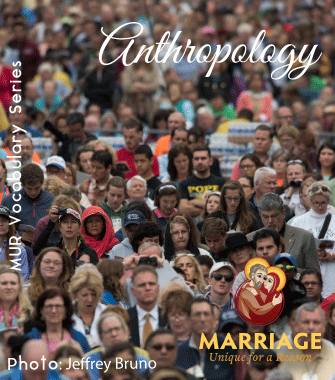 “Anthropology” is the study of human beings. Like many topics of study, it lends itself to further specification, such as our topic today: theological anthropology.
“Anthropology” is the study of human beings. Like many topics of study, it lends itself to further specification, such as our topic today: theological anthropology.
Since theology is the study of God, the juxtaposition of these two terms would be hard to understand or justify in any belief system besides Christianity. Only in Christ does God become man and thus open the door to the study of the human being in light of who God is. Since Jesus is true God and true man, not only can we consider ourselves in light of him, but we must, if we truly want to know ourselves.
Many—if not all—of the questions confronting the Church today about marriage (among other issues) have their roots in questions about anthropology—who man and woman are. This may be why Pope St. John Paul II spent so much of his pontificate exploring this question of who man is. In his very first encyclical, Redemptor Hominis, John Paul II quoted a phrase from the Second Vatican Council that would come to be one of his most-used lines: “Christ the new Adam, in the very revelation of the mystery of the Father and of his love, fully reveals man to himself and brings to light his most high calling” (Gaudium et Spes, no. 22). Only in light of this truth, he said, does man discover “the greatness, dignity and value that belong to his humanity” (RH, no. 10). John Paul II echoes this again in Veritatis Splendor, where he wrote, “only in the mystery of Christ’s Redemption do we discover the ‘concrete’ possibilities of man” (no. 103). And in Fides et Ratio, we read, “the more human beings know reality and the world, the more they know themselves in their uniqueness, with the question of the meaning of things and of their very existence becoming ever more pressing” (no. 1). Put another way, human beings are the creatures that ask, “Why?”
The whole of Pope St. John Paul II’s theology of the body could be understood as a reflection on theological anthropology. Beginning with Adam and Eve, in response to Christ’s direction in Matthew 19 to consider “the beginning,” John Paul II reveals the profound meaning of man’s being made male and female in the image of God. We are “Made for Each Other” and made to bring God’s loving presence into the world. The sexes can be understood as truly one and equal in dignity, but at the same time, totally different. This seeming paradox is possible only in light of a Trinitarian God, in whom difference is not subordination or conflict but the basis for fruitful communion.
John Paul II’s work is called an “adequate anthropology.” This doesn’t mean that it is “barely passable” as a way of understanding the human being. Instead, since we cannot know everything about ourselves, the Holy Father offers us an adequate place to start. (St. Augustine famously noted that God is “more intimate to me than I am to myself.”) In order to grasp something of our own mystery, we need to know, at the very least, that we are created man or woman, a son or daughter, and called to be a father or mother (in some way). Only this is an “adequate” beginning, a portrayal fitting to our identity as humans.
These considerations are ever more important as we approach the current cultural landscape, where every one of these assertions is questioned. We live in a world where people think that, instead of receiving their sexual identity as part of who they are, they should be able to choose their own sex, and that, instead of receiving new life as a gift, they seek control over the coming-to-be of new life, or its destruction. All of these choices have drastic consequences, not only for the individual soul, but for all of us.
Now even the government seems bent on forcing everyone to agree with this false anthropology—one that is not an adequate consideration of what and who a human being is. For example, take a recent veto of a bill in South Dakota regarding facility use. The measure, which passed both houses in the state legislature, would maintain the biological separation of bathrooms, but included provision of “reasonable accommodation” to those who consider themselves to be “transgender” (by providing single-occupancy restrooms, for example). This was not good enough, apparently—everyone must be forced to accept a person’s chosen “gender identity.” And of course the HHS Mandate is all about forcing everyone to provide contraception regardless of their convictions. The anthropology peddled today is a radical disassociation from reality, from the truth of ourselves as sons and daughters, fathers and mothers. We cannot allow this false anthropology to let us forget who we are.
Leave a Reply